If people are interested, they can subscribe to my blog, so anytime I post an entry, they can get notified by email or RSS feed. To subscribe by email or RSS, just click on one of the links in the right sidebar.
On Saturday, the gentleman to my right asked a lot of thought-provoking questions about vegetarian and vegan diets. Since I have not done too much to look into this area (obviously what I’m advocating is contradictory, with meat), I could not give him great answers to his questions. I do know that just because people switch to an all-plant diet, that doesn’t mean they will be healthy. High blood pressure, cholesterol, life-threatening nutritional deficiencies, etc. can still exist. In fact, I know a vegan who almost died of an iron deficiency, a common problem among vegetarians and vegans.
Anyway, one of his questions had to do with good sources of fat. I totally forgot about avocados. They are a great source of monounsaturated fat and have a complete protein profile, supplying all the amino acids you need. I make guacamole and use it as a salad dressing or in Mexican dishes.
One woman asked about recipes. Great recipes are necessary for any successful eating plan. Here’s a link to recipes on my site and links to other recipe sites. I decided to add and organize the Other Recipes section in honor of her.
For recipes, it’s important to add lots of spices to food to give it lots of flavor. Spices, too, have great medicinal properties, like good omega-6 to omega-3 ratios, reducing inflammation. The Cook Yourself Thin site has wonderful recipes (there’s a great cookbook, too, Cook Yourself Thin: Skinny Meals You Can Make in Minutes, but all the recipes are on the website). However, I caution everyone to stay away from the floury products.
Also, bulk up your food with vegetables (doesn’t include potatoes). I actually eat a high-fiber diet.
The doctor asked about the Ornish diet (low-fat). In a previous email to Herb, I asked him to pass on a correction I sent him about Dean Ornish. Ornish is still alive; however, Nathan Pritikin, who was well-known for the Pritikin diet, a low-fat diet, contracted cancer and committed suicide. Obviously, the Ornish diet runs counter to what I’m advocating on many items on the list.
Here’s the problem with the low-fat claim: is it really the low-fat part of the diet that is preventing heart disease or is it the high-fiber diet? Or could it be that people are eating fewer calories, too? All three variables have different effects on the body. This is why there is no conclusive evidence that the low-fat part actually prevents heart disease. While Ornish is concerned with heart disease, what about cancer and some other diseases, like arthritis and other auto-immune diseases? Since there is evidence to show that low-fat diets actually increase the risk of cancer and cerebral hemorrhage, I suggest that this diet could possibly cause other diseases.
There is no doubt in my mind that grain-fed supermarket meat of any kind, including farm-raised fish, is unhealthy and causes all types of diseases, including heart disease. However, all fats aren’t equal. I would suggest that Ornish is correct in at least that some of the fats are not healthy, which I also talked about on Saturday and why: there’s too much omega-6 in the fat of grain-fed products. However, that’s not true of grass-fed products; in fact, you do want to eat the fat of grass-fed products to get the omega-3, CLA, and other fat-soluble vitamins. One thing to note: farm-raised fish are not eating their normal food and may be grain-fed. Therefore, eating less of grain-fed meat/fish is a wise choice.
The Ornish diet does have merit in that it is high-fiber. It is absolutely essential to eat a high-fiber diet if you are eating processed foods because they create constipation. By staying in your system longer, there is a much greater chance of the toxins in your intestines damaging your body. It’s interesting to note that the British navy punished sailors by giving them bread and water. This wasn’t to limit their food choices. Bread and water actually cause intestinal distress, making a person constipated. Constipation is a Western disease.
I didn’t talk about eating fish because that brings up a whole other set of issues, like pollution, mercury, and other heavy metals. Don’t eat large fish, like swordfish, that build up toxins over many years. In fact, it’s best to check the Seafood Watch Program | A Consumer’s Guide to Sustainable Seafood before buying any fish. The site has cool Seafood Watch Pocket Guide to keep in your wallet. Do eat seafood because it’s high in nutrients and omega-3 fatty acids, but the recommendations I’ve seen are eat no more than three servings per week.
Eat a large variety of a lot of different foods to take advantage of different nutrients. This is another problem I have with grains, which are calorie-dense and supply few nutrients for the calories. You can eat a large amount of fruits and vegetables with a variety of nutrients from multiple sources for the same calories in one serving of a slice of bread.

